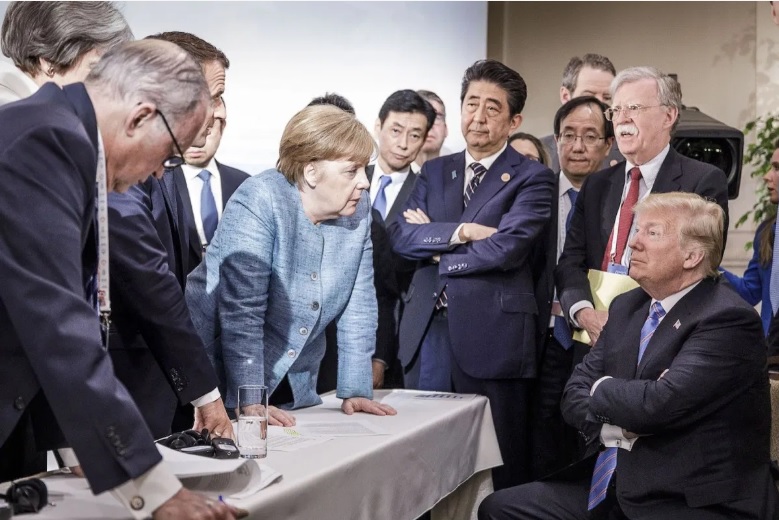Trump is the real threat to the West, not Huawei
Trump is the real threat to the West, not Huawei
Washington’s claim that the Chinese telecom giant’s 5G network will undermine national security is unfounded
By GEORGE KOO
Germany’s Chancellor Angela Merkel gets a point across to US President Donald Trump at the G7 summit in Canada on June 10, 2018. Photo: Jesco Denzel / Bundesregierung / dpa / for Reuters
House Speaker Nancy Pelosi flew to Munich to join the Trump Administration in piling on Huawei, China’s largest telecommunication company. She told the international audience that Huawei’s 5G undermines national security, threatens human rights and democratic values and takes away economic independence.
Madam Fu Ying, China’s former vice minister of foreign affairs, who was in the audience at the 56th Munich Security Conference, pointed out to Pelosi that for the last 40 years, her country has imported all sorts of technology from the West and never felt threatened by the use of foreign technology.
How come, Fu asked, just one company can pose such a grave threat to western democracy? You must have very little confidence in the stability of your own government to be so worried, she suggested.
Pelosi’s somewhat sputtering response was that Huawei was more than just one company, that it has the backing of the mighty People’s Liberation Army (PLA). This was a frequently bandied about accusation based on the fact that its founder Ren Zhengfei was once an officer in the PLA. He left the military and founded Huawei many years ago, but his past continues to dog him.
Dredging up old charges and piling them on Huawei was exactly what the Trump White House has done to justify accusing the company of racketeering among other heinous (hilarious?) offenses. Even an old dispute settled with Cisco nearly 20 years ago was exhumed.
Huawei, a major international company doing over $100 billion of business annually, has suddenly become a front for gangsters, we are expected to believe.
This is clearly the handiwork of the former “we lie, we cheat, we steal” director of the CIA, Secretary of State Mike Pompeo. In Munich, he called Huawei a Trojan horse intent on undermining the sovereignty of governments at every level in Europe.
Of course, no other country knows better than the United States how to steal intelligence from others. As reported by the Washington Post, the CIA jointly developed and produced the CRYPTO AG, an encryption machine introduced over 70 years ago and sold to 120 countries for use in the internal transmission of top-secret information.
What these user countries, some friendly to America, didn’t know was that the CIA was reading their secret transmissions right along with them.
The United States knows how to steal information. You could hardly blame them for suspecting that others such as China would naturally do the same.
Pompeo has been calling on various heads of state to try to convince them not to adopt 5G from Huawei. Apparently, Pompeo’s shadowy reputation preceded him, and his exhortation has fallen mostly on deaf ears. The economic advantages of sticking with Huawei and its already built-in infrastructure may outweigh the benefits of listening to Pompeo.
Thus it was necessary to, as Asia Times writer David Goldman observed, double down by ascribing every imaginable possible evil to Huawei. Goldman’s analysis also concluded that the American campaign to suppress Huawei was clearly failing.
The Goldman piece also mentioned that the Trump team is considering a ban on selling GE jet engines to China for the commercial jet liner it is developing. Over the short term, this would wreck China’s plans to compete with Airbus and Boeing.
But as Asia Times pointed out, the economic devastation would be mutual. By being deprived of the right to cater to the Chinese market, GE’s return on its investment on the development of the advanced engine design would be greatly deferred.
In the meantime, China would be forced to seek an engine manufacturing partner in Russia or Ukraine, or perhaps pursue a deal with GE’s French partner. However long that would take, China would eventually become a competitor and help carve up the jet engine market.
At the same time, China would buy more Airbuses and fewer, if any, Boeings – an obvious response to the US strategy to decouple with China.
The same approach has been taken against Huawei and ZTE. Namely, restrict the sale of key American-made semiconductor components to the Chinese makers of mobile phones.
The US has forced Huawei to develop its own chipsets and graphics processors. The long-term consequence is the prospect of a significant loss of sales for the original American suppliers that may even drive them out of business.
Trump’s China team is either stupid or living in the past if they think America’s technical might can continue to keep China under water. Other nations, friendly or non-aligned, have a more realistic view and are moving away from the US sphere of influence. It must have been quite a shock for the Pentagon when the Philippines recently announced it would end its collaboration with the US Navy.
Since Pelosi, a freshman congresswoman, unfurled a human rights banner on Tiananmen Square in 1992, she has had her own axe to grind with China. However, getting in a bipartisan bed with Trump on China seems terribly unwise. As Fu Ying asked in Munich, why would Pelosi want to wear the same trousers as Trump?
It is the man currently living in the White House, a leader who wilfully shreds the constitution, considers himself above the law and tries to keep his crooked cronies from going to jail. No one is a greater threat to the stability and security of the United States than Donald Trump.
Surely, Pelosi understands what’s at stake by picking on China

